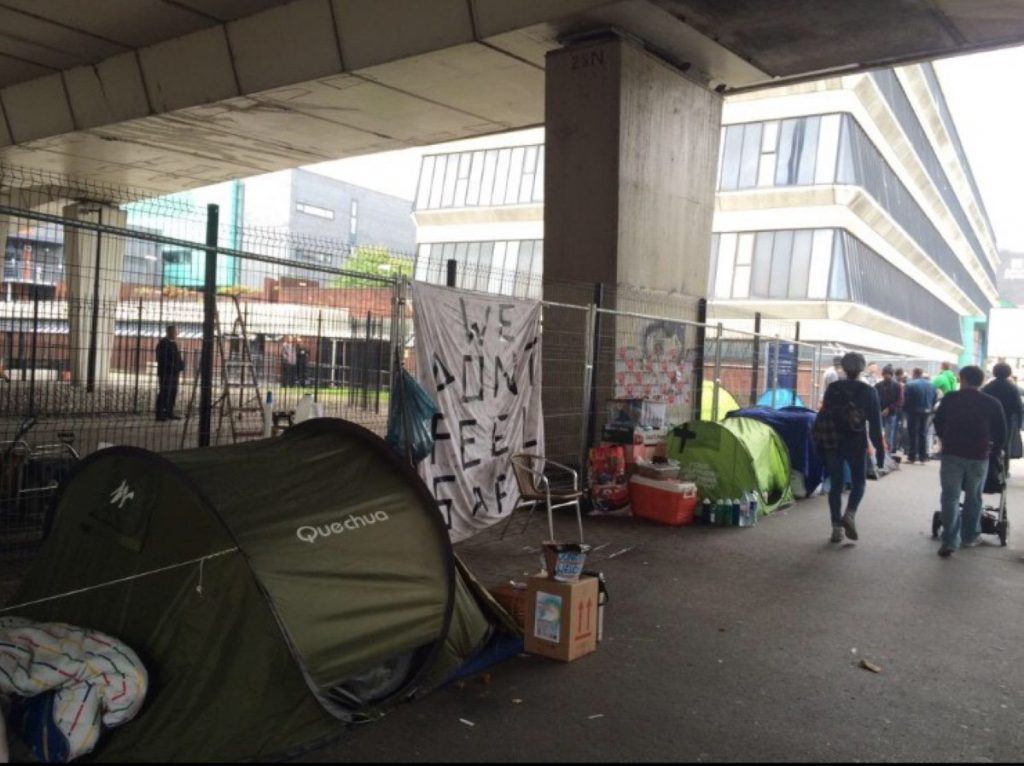As cardboard cities return, councils criminalise the homeless
It's never been unusual to see the odd rough sleeper on a park bench or a person begging outside a train station. But as homelessness increases it's becoming just as common to see whole camps of people bedding down together in city centres or pitching up tents on green space.
Barely a month passes without a report of another camp springing up somewhere. One of the most well-known is The Ark in Manchester, a self-built shelter which, before it was removed, had sofas, a kitchen area and a generator to provide power. But there are many others.
There's the tent city alongside a river in Bedford which became home to around 40 people. In Southampton, there's a group of rough-sleepers who used cardboard boxes and tarpaulin to turn part of a historic monument into a camp. And there's a group in Milton Keynes who set up a site behind a 99p shop. There are other examples in Bristol, Southend and Devon, to name just a few.
Earlier this year, Politics.co.uk reported on the camp in Manchester. The people staying there told us they felt more protected in a group than they did staying alone. "We feel safer sleeping in tents and sticking together. We know people who have been attacked, spat on and even set on fire while they were sleeping alone in shop doorways. We are safer this way," said Ryan McPhee.


Government statistics show that rough sleeping in England has increased by 55% since 2010. The charities Crisis and the Joseph Rowntree Foundation are conducting a five-year study into homelessness which draws on a survey of councils, statistical analysis and in-depth interviews. Their annual report, which was published earlier this year, warned that a chronic shortage of affordable housing combined with cuts to benefits and homeless services would see rough sleeping continue to rise across England.

As the problem becomes more visible, some local authorities are coming up with controversial ways to keep it out of sight. Last week, Bournemouth council came under fire for playing the sound of bagpipes and Alvin and the Chipmunks through speakers during the night to prevent homeless people from sleeping around the town's Travel Interchange.
Earlier this year, Manchester council banned people from sleeping in tents in the city centre in protest against its homeless policies. And in recent months there has been widespread concern over the number of councils considering the use of Public Space Protection Orders (PSPO) to ban homeless people from prominent areas.
In October, Oxford council voted for the introduction of a PSPO which will give it the power to fine beggars and buskers. Newport council recently set out plans to use a PSPO to ban rough-sleepers from the city centre, ahead of the opening of a new shopping centre. It was later forced to back down after the proposals were slammed by charities. Councils in Liverpool and London have also considered similar plans.
The civil liberty organisation, Liberty has raised serious concerns with many of these councils about their plans, warning that some might be in breach of the human rights act. "We’ve seen a rash of proposed PSPOs nationwide which risk criminalising the most vulnerable in society," says Rosie Brighouse, the legal officer for Liberty.
"Sleeping rough isn’t anti-social behaviour – it’s poverty. Yet rather than alleviate such hardship these Orders simply fast-track so-called ‘offenders’ into the criminal justice system.”
With many homeless services facing budget cuts, it's hard to see the situation improving any time soon. And this type of 'out of sight, out of mind' thinking from councils is doing nothing to tackle the problem. All it does is move it somewhere else and in some cases exacerbate it – how is fining a homeless person going to help anybody? Rather than trying to hide the issue away, councils have a duty to protect their most vulnerable people and at the very least to ensure everybody has a roof over their heads.

